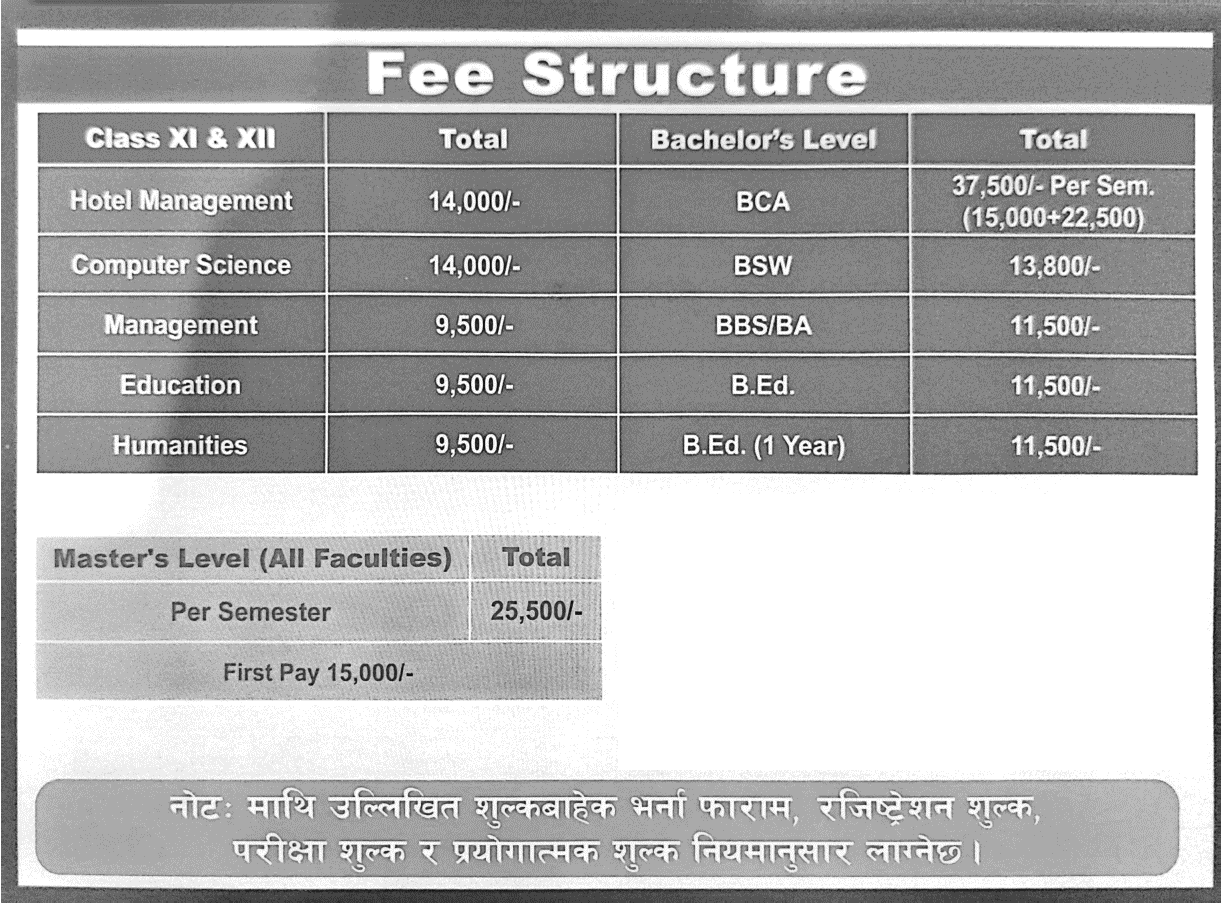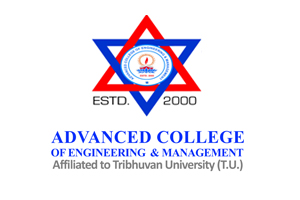Overview
Pashupati Multiple Campus (PMC) in Mitrapark, Chabahil, Kathmandu is a public higher-education institution affiliated with Tribhuvan University (TU) and the National Examination Board (NEB). Established in 1981 AD (2037 BS), the campus offers NEB Ten-Plus-Two (+2) programs and TU undergraduate and postgraduate degrees (BA, BBS, BEd, BCA, MA, MBS, M.Ed.).
Education awakens awareness, drives development, and shapes civilization. A well-educated, capable population is a nation’s core strength, and the state of education signals the future. National progress follows the ideals, objectives, and pace set by education. In this setting, Pashupati Multiple Campus has maintained a clear identity by delivering quality education over time.
Founded in Bikram Sambat 2037 as a community campus, it set out to expand higher learning in Kathmandu’s northeastern corridor. Based in Chabahil, Mitrapark, the institution has grown to national recognition. For more than four decades, it has offered accessible, quality education and produced capable graduates who contribute meaningfully to Nepal’s higher-education landscape.
The campus emerged to advance higher education in the city’s northeast. After a new education system was introduced, private colleges were fully nationalized. When it became clear that this approach was not achieving its aims, the Ministry of Education and the Government of Nepal again permitted campuses to operate in the private sector. Local distinguished personalities, social workers, and education enthusiasts then established the campus without donations from any association or organization.
The name “Pashupati” honors Lord Pashupatinath, the national deity; despite the religious name, the institution provides modern education that is affordable and accessible, aligned with parents’ expectations for their children. The campus has progressed steadily, operates in its own buildings, and holds about 32–34 ropani of land in Kathmandu, financed through fees paid by parents and students. Its long-term goal is to grow into an excellent academic center and ultimately establish Pashupatinath University.
Beyond academic results, the campus emphasizes broad capacity building. It has a consistent record of nurturing citizens of character who are capable and diligent. Alumni have made notable contributions in educational, political, administrative, social, cultural, and literary fields in Nepal and abroad.
Each year, more than 5,000 students study at the campus. Many graduates move into roles across banking, hotel management, journalism, and retail, strengthening both skills and careers. The campus maintains quality across faculties. Students demonstrate their abilities through regular internal evaluations and examinations designed to support employability, and the teaching staff is highly capable.
To support mental, intellectual, and physical growth, the campus runs activities alongside regular study. These opportunities help students develop talents beyond coursework and further strengthen the campus’s reputation.
Pashupati Campus was founded by education-focused community leaders with an aim to widen access to quality higher education in Kathmandu’s northeast corridor. The campus launched Proficiency Certificate-Level (PCL) Humanities in 2037 BS, followed by PCL Management in 2041 BS, Bachelor’s programs in Humanities (2045 BS) and Management (2047 BS), NEB higher secondary (+2) in 2052 BS, B.Ed. in 2058 BS, and later master’s degrees in Sociology/Anthropology, Nepali, and Management (MBS).
Over the years, PMC has expanded into a multi-program institution under TU and NEB, maintaining public-sector values of inclusion, affordability, and academic discipline.
Academic offerings now span +2 to master’s level, enabling students to progress within a single institution. The campus provides classroom learning, guided practicals, library resources, counselling, and placement support appropriate to each discipline and level.
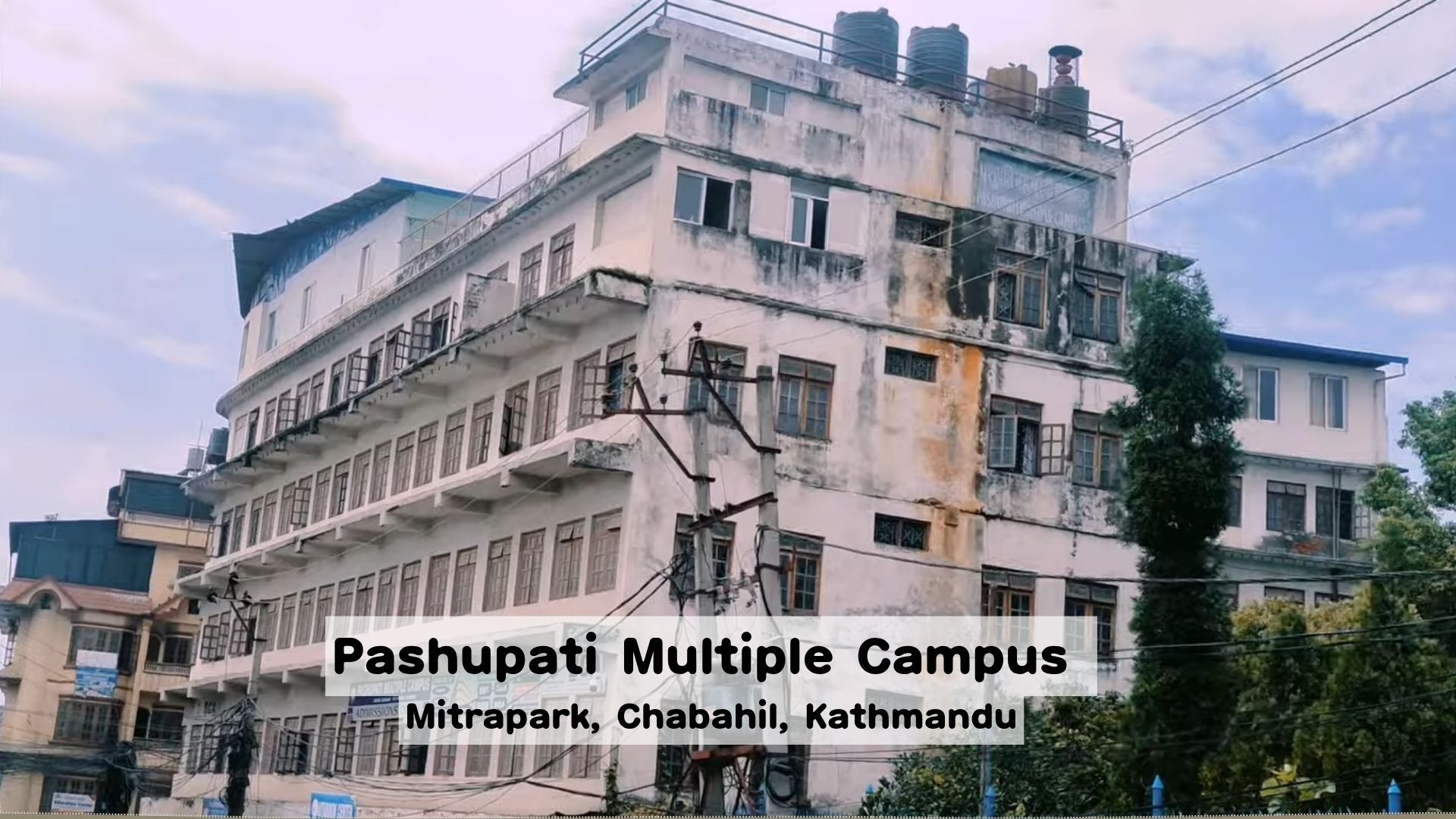
Quick Highlights
-
Established: 1981 AD (2037 BS)
-
Location: Mitrapark, Chabahil, Kathmandu
-
Affiliations: Tribhuvan University (TU); National Examination Board (NEB)
-
Programs (NEB): +2 Management, +2 Humanities, +2 Education
-
Programs (TU – Bachelor): BA, BBS, BEd, BCA
-
Programs (TU – Master): MA (Nepali, Sociology, English), MBS, M.Ed. (English Education, Health Education)
-
Academic Calendar: TU/NEB calendars and regulations
-
Key Student Support: Counselling & Placement Cell, library, laboratories, mentorship
-
Admission Basis: TU/NEB eligibility rules; entrance tests where required by the concerned TU faculty/office
-
Scholarships: As per TU/PMC policy for meritorious, remote-district, and needy students
-
Community Role: Inclusive access, affordable public education, and locally relevant academic services
Academic Programs Offered
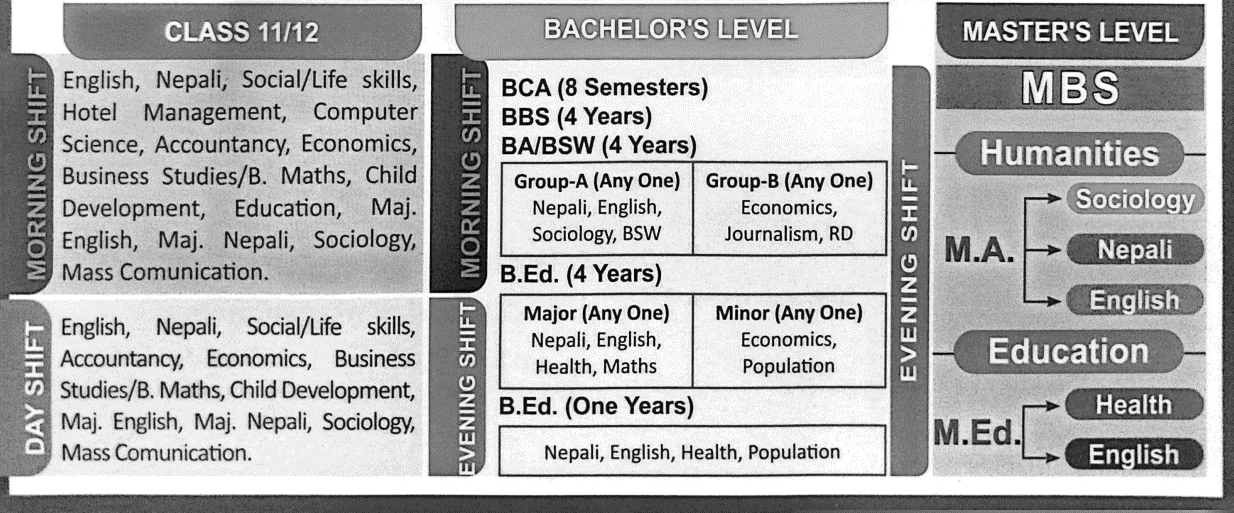
NEB Ten-Plus-Two (+2)
+2 in Management
Builds a steady base in accountancy, economics, and business studies, with optional computer science. A good path toward BBS, BBA, CA, and related degrees.
+2 in Humanities
Explores sociology, mass communication, English, rural development, Nepali, and other social-science subjects. Suits learners drawn to society, culture, and media.
+2 in Education
Early start for future teachers. Covers education, language, and social studies with a focus on classroom foundations.
Eligibility (NEB): SEE or equivalent as per NEB policy for Grade 11 admission. Counselling: Campus advisers help you choose subjects that match your plans.
TU Bachelor’s Degrees
Bachelor of Arts (BA) and BA with BSW
BA (four-year, annual): Choose three subjects from the social sciences, languages, and humanities (e.g., Sociology, English, Rural Development, Population Studies, Nepali, Journalism/Mass Communication).
BSW track: A practice-oriented social work option within BA. Includes classroom study and supervised fieldwork each academic year.
Where it leads: Civil service preparation, development work, media and communication, teaching routes, and research assistance.
Bachelor of Business Studies (BBS)
Structure: Four-year annual system. You begin with core areas—English, statistics, micro/macro-economics, accounting, marketing, and HR—then move to law, finance, taxation, auditing, and strategy. In the final phase, choose a focus (Accounting, Finance, Marketing, or Management) and complete a research project.
Where it leads: Entry roles in banking, finance, accounting, marketing, HR, and entrepreneurship; also a clear route to MBS and other advanced study.
Bachelor of Education (B.Ed.)
Aim: Preparation for secondary-level teaching. You study education foundations, pedagogy, and a subject focus such as English, Nepali, Mathematics, Health & Physical Education, Population Education, Science, Economics, or History/Political Science. The program includes teaching practice and educational research.
Graduates: Eligible for teaching-license pathways under national rules, with working knowledge of curriculum planning, classroom management, and academic leadership.
Bachelor of Computer Applications (BCA)
Focus: Coding and computing fundamentals: C/C++, data structures, web technologies, Java, operating systems, DBMS, software engineering, networks, mobile app development, and basics of AI. Electives may include e-commerce, cloud computing, and network security.
Practice: Major project and an internship in later semesters. Writing and quantitative courses build clear technical communication.
Where it leads: Entry-level roles in software and web/app development, system administration, and a base for further study in IT.
TU Master’s Degrees
Master of Business Studies (MBS)
Duration: Two years (semester system), four semesters.
Study areas: Managerial communication and economics, organisational behaviour, statistics, finance, HR, marketing, operations, business environment, management accounting, research methods, strategy, entrepreneurship, international business, specialisation courses, and a thesis/project.
Where it leads: Roles in corporate, banking, public, and development sectors, plus preparation for doctoral-level research in management.
Master of Arts (MA)
Specialisations: Nepali; Sociology; English.
Focus: Advanced subject knowledge, research methodology, academic writing, and a thesis or project.
Careers: Teaching, research, publishing, media/communication, and policy analysis.
Master of Education (M.Ed.)
Specialisations: English Education; Health Education.
Core study: Philosophy and sociology of education, educational psychology, curriculum and evaluation, research methods, ICT in education, specialisation modules, and thesis/practicum.
Where it leads: Teacher educators, curriculum planners, academic leaders, and specialists in health education programs.
Admission Process
NEB +2
-
Eligibility: SEE or equivalent per NEB rules.
-
Process: Application at the campus, subject selection counselling, and seat confirmation within campus timelines.
TU Bachelor’s (BA, BBS, B.Ed., BCA)
-
Eligibility: +2 or equivalent with a minimum D+ in all subjects of Grades 11 and 12 for TU bachelor’s programs, as applicable.
-
Entrance: For programs that require it (e.g., BCA and other TU-specified courses), applicants sit for the entrance examination conducted by the concerned TU office/institute.
-
Selection: Campus follows TU notices on merit lists and admission windows.
TU Master’s (MA, MBS, M.Ed.)
-
Eligibility: Relevant bachelor’s degree from TU or a university recognised by TU.
-
Entrance: Where TU faculties/central offices require a standardised test for a given intake, applicants must take that test and meet the qualifying score.
-
Intake: The campus publishes intake notices aligned with TU’s academic calendar.
Note: Entrance formats and eligibility rules are governed by TU and may vary by year and program. Applicants should refer to the latest TU and campus notices during application windows.
Fee Structure
| Class XI & XII | Total Fee Rs. |
| Hotel Management | 14,000/- |
| Computer Science | 14,000/- |
| Management | 9,500/- |
| Education | 9,500/- |
| Humanities | 9,500/- |
| BCA | 150000 |
| BSW | 13800 |
| BBS/BA | 11500 |
| B.Ed. | 11500 |
| B.Ed. (1 Year) | 11500 |
| Master's Level (All Faculties) Total | |
| Per Semester | 25,500/- |
| First Pay | 15,000/- |
Teaching Faculty and Learning Methodology
Pashupati Campus follows TU/NEB syllabi with a routine that keeps students active in every class. The approach is simple: clear teaching, steady practice, and regular feedback.
-
Classes are led by experienced subject teachers. When a topic needs current practice or field input, the campus invites visiting professionals.
-
A typical week mixes lectures, guided discussions, short tutorials, and unit tests planned against the official course outline.
-
Teachers use slides, charts, models, and projectors to make ideas easier to grasp.
-
Evaluation includes internal work (where applicable) and the final TU/NEB exams. Some programs add project reports, school teaching practice, or field tasks.
-
Mentoring is available for choosing programs, planning study schedules, and preparing for exams.
Infrastructure and Learning Facilities
Facilities are arranged to support daily study and exam readiness.
-
Classrooms are spacious and well-ventilated, with the usual teaching aids for lectures and review sessions.
-
The library holds around 4,000 books—course texts, references, manuals, magazines, newspapers, and competitive-exam resources. A reading room seats about 50 students during working hours.
-
Laboratories match program needs. Science and technology streams use discipline-specific labs; computer labs provide scheduled internet access for coursework and projects.
-
ICT access supports BCA and other programs that need hands-on computing.
-
Student services include academic counselling, basic placement guidance, and support for higher-study planning.
Student Life and Campus Experience
Students come from many districts and backgrounds. The Mitrapark location is easy to reach by public transport. The academic year runs on TU/NEB calendars, and the campus hosts seminars, guest talks, and review sessions at intervals. Learners aiming for civil service, business, teaching, or IT find peer groups that make collaboration and exam preparation easier.
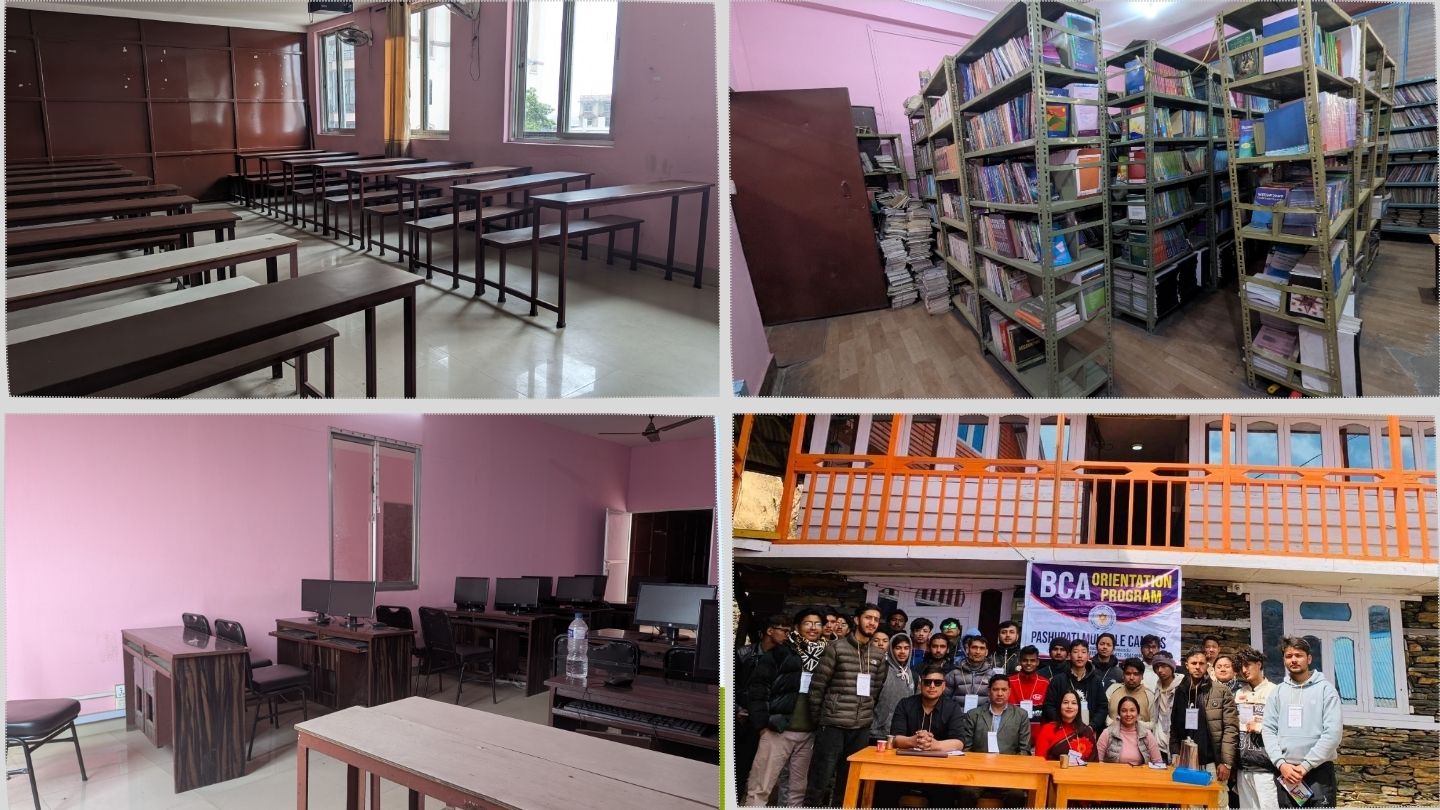
Extracurricular Activities (ECA)
The campus encourages growth beyond the classroom.
-
Academic clubs run topic discussions, peer-learning circles, and paper presentations.
-
The Counselling & Placement Cell offers sessions on communication, interview practice, and resume writing.
-
BA/BSW and education programs link to community work through field visits and school-based activities where relevant.
-
Sports and cultural events are organised by student bodies and the campus administration.
Scholarships and Financial Support
Financial support follows public-campus rules and TU policy.
-
Categories include consideration for remote-district and board toppers, and for needy and deserving students.
-
Scholarship notices are issued during admissions. Applicants submit required documents within the stated deadlines.
-
Fees follow an affordability focus. Detailed information appears in the campus admission notice for each intake.
Achievements and Institutional Milestones
-
2037 BS (1981 AD): Campus established; permission for PCL Humanities.
-
2041 BS: Permission for PCL Management.
-
2045 BS: Bachelor’s in Humanities initiated.
-
2047 BS: Bachelor’s in Management initiated.
-
2052 BS: NEB higher secondary (+2) programs started.
-
2058 BS: B.Ed. launched.
-
Subsequent Years: Master’s degrees added in Sociology/Anthropology, Nepali, and Management (MBS); later expansion to MA English and M.Ed. specialisations.
These stages reflect a steady transition from PCL to +2 and bachelor’s to master’s, aligning the campus structure with national higher-education reforms under NEB and TU.
Why Choose Pashupati Campus?
-
Public Institution: TU constituent campus with mission-driven access for a broad segment of society, including students with financial constraints.
-
Program Continuity: +2 to master’s options across humanities, management, education, and IT for seamless academic progression.
-
Location Advantage: Mitrapark, Chabahil, with transport access and urban academic resources.
-
Teaching Practice and Fieldwork: Structured practice for B.Ed. and BSW; projects and internships for BCA and management programs.
-
Student Support: Counselling & Placement Cell for academic guidance, higher-study pathways, and job readiness.
-
Resource Base: Library holdings, computer labs, and discipline-specific laboratories to support coursework and projects.
Message from the Campus Chief
“Pashupati Multiple Campus advances as a technical and general education institution under NEB and Tribhuvan University. Our focus is a supportive learning environment where students gain the knowledge and practical skills required for current and emerging work settings.
We serve learners from every section of society, including those with limited financial means. The aim is to prepare graduates who can work confidently in their local context and abroad. Guardians, students, and well-wishers are invited to learn more about our programs and to reach out with questions. We look forward to welcoming you to Pashupati Multiple Campus.” — Binod Chandra Panta (Campus Chief)
Conclusion
Pashupati Multiple Campus is a public, TU/NEB-affiliated institution with a long-standing presence in Kathmandu’s Mitrapark area. From +2 to master’s, the campus offers structured pathways in humanities, management, education, and IT. Teaching is grounded in TU/NEB curricula, with library and lab support, counselling, and placement services. Scholarships are considered under TU policy to keep access equitable. The campus’s historical timeline shows steady growth and alignment with national frameworks, making it a practical choice for students seeking credible academic progression within Nepal’s public system.
Frequently Asked Questions (FAQ)
1) Which programs are available after SEE?
NEB +2 in Management, Humanities, and Education. Subject combinations are finalised during admission counselling.
2) What bachelor’s courses can I join after +2?
Under TU: BA, BBS, B.Ed., and BCA. Each program follows TU’s eligibility rules; some require an entrance test conducted by the concerned TU office.
3) Do master’s programs require entrance tests?
For MA, MBS, and M.Ed., applicants must hold a relevant bachelor’s degree recognised by TU. Where TU mandates a standardised entrance for a given intake, applicants must sit for that test and meet the qualifying score. Campus notices clarify the requirement each year.
4) Does the campus provide scholarships?
PMC considers scholarships for remote-district and board toppers and for needy and deserving students as per TU and campus policy. Details are announced at admission time.
5) What learning facilities are available?
A library with around 4,000 books and a reading room; laboratories including computer labs with scheduled internet access; classrooms equipped with standard teaching aids.
6) Is there fieldwork or teaching practice?
Yes. BSW includes supervised fieldwork each academic year; B.Ed. includes teaching practice; IT and management programs include projects and, where applicable, internships.
7) How does the Counselling & Placement Cell support students?
It offers academic counselling, career planning guidance, resume and interview workshops, and connects students to campus recruitment drives and internships when available.
8) Can I progress from +2 to master’s within PMC?
Yes, subject to eligibility and seat availability, students can advance from +2 to TU bachelor’s and then to master’s programs offered on campus.
9) Where can I find the latest admission notices?
Follow official TU/NEB notices and PMC admission announcements during the intake period. Requirements can change by year, so rely on current notices.
10) Does BCA have project work and internship?
Yes. BCA includes major project work and an internship (typically in the final stage), along with elective options aligned to current IT practices.
Contact Pashupati Multiple Campus's administrative office for detailed information on the course, admissions, location, fees, scholarships, facilities, counseling, or eligibility.
Contact Details
Pashupati Multiple Campus
Email Address: info@pashupatimultiplecampus.edu.np
Phone Number: +977-1-4570412, +977-1-5904848, +977-1-4468364
Website: https://www.pashupatimultiplecampus.edu.np
Location: Mitrapark, Chabhil, Kathmandu, Nepal


